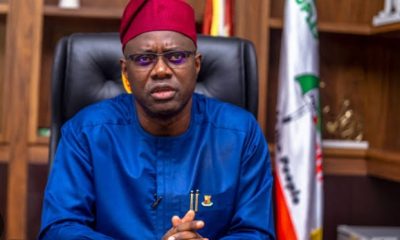Featured
In Oyo, Makinde’s Leadership Trumps Governance | By Sulaimon Olanrewaju

Governance is often confused with leadership but the two are poles apart. Governance is routine and predictable but leadership is innovative and dynamic. Governance is maintaining the status quo but leadership is about extending the frontiers.
Governance is a structure that provides a framework for running a system; it identifies roles, establishes orders, stipulates sanctions and postulates the reward system.
Governance facilitates the smooth running of a state. So, good governance is about doing the expected; it is about following the procedure; it is about keeping the hands off the till and ensuring the effective management of available resources. But leadership is much more than that. Leadership is about bursting out of routine, it is about challenging the status quo, it is about changing the course of history, it is about shaping and reshaping geography, it is about unleashing the power of a people to have new dreams, new hopes and new expectations. Leadership is bridging the gap between possibilities and realities. It is unlocking a people’s innate abilities to actualise their potential.
The defining difference between governance and leadership is the size of the vision behind each; while governance’s focus is the moment, leadership’s vision encompasses both the present and the future. Leadership weighs the impact of every action by its effect on the future. Leadership dreams big. Leadership aims high. Leadership is audacious. Leadership is ambitious.
Leadership is intentional. Leadership knocks off the limit. Leadership is neither deterred by difficulties nor dissuaded by impossibilities. Where leadership reigns, impossibility is crushed.
refuel in Ibadan, thus providing an alternative to airports in Nigeria and other West African countries.
The facility improvement resulted in an increase in the number of airlines operating at the airport as well as the number of flights in and out of the airport. Thus, the tethered giant started showing signs of greatness gradually. Therefore, upgrading the airport to international standard is a natural follow-up to the investment of the state in the airport.
In the same vein, having an international airport is a sequel to what Governor Makinde has already put in place in the state; from developing the state’s human capital to creating various opportunities for the citizens, to strengthening small and medium scale businesses, supporting smallholder farmers, connecting all the zones with good roads, creating an enabling environment for businesses to thrive, investing in the development of agribusiness and positioning the state to take advantage of its tourism sites as well as its cultural heritage. This is because aviation is an enabler of trade, a harbinger of investment, a promoter of agriculture, a facilitator of manufacturing and an ally of tourism. So, aviation is a major driver of development.
Experts have opined that upgrading the airport would increase the state’s visibility, accessibility and viability, which could attract investment capital and stimulate growth in various sectors of the economy. They also state that the presence of an international airport in the state would boost tourism-related ventures, real estate development, and other business opportunities. They add that the international airport will lead to the creation of job opportunities and boost regional and international trade in the state.
Explaining the rationale behind the upgrade, Makinde, while speaking at the inauguration of the Bimbo Adekanmbi-led committee which was constituted to midwife the airport upgrade, said upgrading the Ladoke Akintola Airport to international standard would support his administration’s drive to expand the economy of the state through agribusiness.
He added: “The decision to convert our existing local airport into an international airport was not a hasty one; we are not engaged in a let-me-do-this-because-other-governors-are-doing-it-competition.
“This is a well-thought-out decision based on science, logic and data. This vision is already four years old and we laid the groundwork in our first tenure.”
He added, “We have preliminary data to support this move and part of the work this committee will be doing is providing us with the definite numbers through a comprehensive passenger data analysis and ensuring that all the groundwork is laid to fulfil requirements for building an international airport as stipulated by the Nigeria Civil Aviation Authority (NCAA).”
While speaking on the benefits of having an international airport during the ground-breaking ceremony of the upgrade the other Wednesday, Governor Makinde said, “This airport will connect Oyo State to the global market. It will improve ease of doing business, bringing investments into agribusiness, manufacturing and technology sectors and positioning Ibadan as a true regional business hub.”
The governor, who listed MRO and cargo facilities as some of the features the upgraded airport would parade, described the project as a strategic investment that would be delivered on time and within budget.
However, while the bulk of the citizenry is having a kick out of the prospect of having an international airport, the first phase of which the Governor promised would be ready within 12 months, some people in the state are kicking against the project. In the estimation of those people, an international airport in Ibadan would not serve the majority of the citizens, so it should not be the priority of the state.
For such people, a retreat into history would be quite helpful.
When Chief Obafemi Awolowo, as Premier of Western Nigeria, established the Western Nigeria Television (WNTV) in 1959, there was no market for the services of the station in Ibadan or elsewhere on the continent. As a matter of fact, the number of television sets in the country was less than 20. So, there was resistance to the move as some people felt that the television station should not be the priority of the region.
But because Awolowo saw into the future, he went against the grain and set up the television station, which was the first in Africa. Today, tens of millions of people across the African continent earn their living from television. Today, Ibadan is regarded as the home of television in Africa. This is one of the reasons Oyo State is regarded as the pacesetter in the country.
In the same vein, 20, 30 or 40 years from now, when Ladoke Akintola International Airport gains global renown, transforms Ibadan skyline, facilitates business clusters in Ibadan and yields phenomenal dividend to the state from aviation-related activities, it would be said that all these came to be because an audacious leader braved the odds to confer international status on an erstwhile backwater airport.
Leaders see farther than others because while others concentrate on the next election, they think about the next generation. Leaders intentionally choose to see opportunities where others see crises; they also deliberately choose to see prosperity while others focus on adversity. That is why they are able to bridge the gap between possibilities and realities. Hence, history is weaved around their strides.









